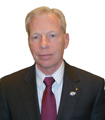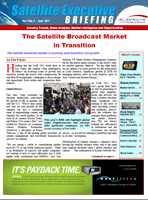Interview with Patrick Rayermann
San Diego, California, February 1, 2012- At the West show in San Diego last month, Satelltie Markets and Research caught up with Patrick Rayermann, the newly appointed Senior Director for Strategy and Development for Orbital Sciences Corporation. Rayermann joined Orbital in November 2011 after 30 years of service in the US Army, where he retired as a full colonel. His final military assignment was the chief steward of Department of Defense’s (DoD) architecture for satellite communications and to serve as the Chief of Staff of the DoD Executive Agent for Space (EA4S) Staff.
He spoke frequently at industry trade shows on the military market for satellite communications and in his first interview since he joined private industry, he shares with Satellite Executive Briefinghis views on the transition from the government to the private sector and his perspective on the launch services market, among others. Excerpts of the interview:
 You retired from active duty after over 30 years of service in September 2011 and you assumed your new position in industry just three months ago. How’s the transition been for you from the government to the private sector?
You retired from active duty after over 30 years of service in September 2011 and you assumed your new position in industry just three months ago. How’s the transition been for you from the government to the private sector?
I’ve been looking forward to the transition for some time, wanting to try my hand in the private sector. I was part of the broader government machine basically since I started nearly 40 years ago at the Jet Propulsion Laboratory. So far it’s comfortable. It’s largely what I expected. It’s fun to be part of an organization like Orbital that really wants to apply its strengths in agility and rapidity of response to meeting government needs.
Talk about your new position as director of strategy and development—do you do strategy just for the government sector or for both government and commercial businesses?
The corporate strategy group is a relatively new group at Orbital. Led by Mike Hamel, Orbital’s Senior Vice President for Corporate Strategy and Development, our group on the corporate staff incorporates everything from government relations to corporate communications to strategic planning. I was primarily hired to help Orbital better understand and better communicate with national security customers like the Department of Defense and intelligence agencies. There may be some opportunities as well for me to work with the commercial sector in the future but that is not my initial focus.
So, what’s the mission of this new strategy group? What are your goals in the next few years?
We are working to develop Orbital’s longer-term strategic approach, as well as coordinating a shorter-term customer engagement plan to be sure the company’s capabilities are well-known throughout the industry. Longer-term, Orbital must be well positioned for business opportunities on a horizon of three to five years and before they are actually right on top of us with a request for a proposal or a solicitation for bid. The intent is to allow Orbital to prepare over a multi-year period for business opportunities that the company’s innovative, reliable and cost-effective solutions will benefit the customer. This may entail the refinement of a product or at least better understanding of the cost and effort it will require to do so. This process may also evolve into establishing relationships with industry partners that will allow us to formulate an integrated solution that we might not been able to offer otherwise.
For those who are not familiar with Orbital’s business, what percentage of its business is commercial and military/government?
We have a very favorable balance in our overall business, with about a third of our revenues derived from defense and intelligence customers, a third from NASA and other civil government customers, and another third from the commercial market, primarily for communications satellites.
So it’s a very even distribution?
Yes, and we like the balance between the three major markets, so that we are not overly reliant on any one particular segment or business area.
As you know, the theme here at the West show seems to be the impending budget cuts to the military, how will that affect Orbital’s business?
The potential for budget reductions in the coming years is very real. One of the reasons Orbital hired me was its assessment that if the company is going to meet its growth targets, it needed to gain a greater share of the defense segment. Our whole team believes that not only do we have a real opportunity to grow, but that we can definitely be part of the solution for the “vicious cycle” of excessive development timelines, cost-overruns, the deployment of outdated technology, and a resistance to innovative new business models, such a hosted payloads, that the industry has seen over the past decade or longer. Orbital offers a more “virtuous cycle” of innovative approaches to space systems development, short cycle times under which we execute our programs, and disaggregated architectures that are more resilient than “single point of failure” large systems; all of which lead to a better cadence of deploying new technologies and are manageable investments on the part of our customers.
I know you’ve only been on the job for three months but how do you view the launch industry, it seem to be getting more competitive with more new players coming on board?
Competition is good and Orbital has never been afraid of competition. But the primary launch vehicle competition going on in the U.S. right now is in the market for larger-class rockets that support government missions. As you probably know, Orbital focuses on the small- and medium-class of rockets. Our fleet is currently being headlined by the development of Antares, a Delta II –class replacement, which we will introduce later this year for NASA’s cargo delivery missions to the International Space Station.
In addition to the domestic market, we are certainly aware of the growing capabilities in places like India and China, as well as lower-cost Russian vehicles. However, our focus is on the U.S. market and we will remain very competitive in each of the classes in which we offer our products and services.





